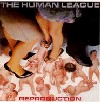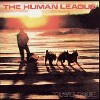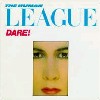The Human League remastered reissues
The BBC Radiophonic Workshop's theme to the Doctor Who series firstaired in 1963, and I'm willing to bet that some, if not all, of thefuture members of the Human League were watching and listening veryclosely. Those spine-tingling washes of synthesizers and alien metallicclangs must have seemed pretty mindblowing to a group of "blind youth"growing up in impoverished Sheffield. Lap dissolve to nearly 15 yearslater, and Phillip Oakey, Martyn Ware and Ian Marsh have formed TheFuture, soon to be rechristened the Human League. While fully revelingin the punk attitude and political urgency of their contemporaries,Human League's music always sounded a little different, theircollective unconscious memory of that Doctor Who theme having pushedthem towards the formation of an all electronic group. Not drums, bassand guitars augmented by synthesizers, mind you. Rather, The HumanLeague were one of the first electronic purists; they used exclusivelysynthesizers and drum machines. What could be more standoffish and punkthan that? From the beginning, Human League had a keen talent foruptempo songs and catchy melodies that set them apart from fellowSheffield bands like Cabaret Voltaire and 23 Skidoo. The Human Leaguewere harboring a desire to make the world's greatest pop record.Electronic pop will never save the world, it's true, but listening tothese Human League re-issues after 20 years of musical developments isan eye-opening experience. Pop music like the Human League's isresistant to musical modes and trends, and if you submit to itspleasures, it is timeless and perfect. - Jonathan Dean
 1979's Reproductionis the first full-length LP by The Human League, following some 12"singles and EPs released the year before. The reissue treatment fullyremasters and restores the sound, as well as adding loads ofsupplemental material, including the ultra-rare The Dignity of Labour EP and their first single Being Boiled. Reproductionfinds the group in pristine form, matching dark, futuristic lyrics withmechanized beats, icy synth melodies and keyboard swooshes. PhilOakey's lyrics elaborate on his childish, science-fiction obsessionwith an apocalyptic view of the future. The second track "Circus ofDeath" is a rambling, surreal narrative about a future holocaustperpetrated by narcotized clowns. Fans of early Gary Numan classicssuch as "Down in the Park" will appreciate this album. All of theelements of the latter day, chart-topping Human League are present, butthe album maintains a consistently arch, clinical distance from thelistener. This is only enhanced by Oakey's wry, detached wit andpassionless delivery. One of Human League's best songs is here, thestrangely upbeat "Empire State Human," a song about avarice and thedesire to attain superhuman powers, set against a relentlessproto-electro beat. By far the strangest track, "Morale," begins withsome ambient synthesizer arpeggios, reminiscent of Tangerine Dream.Philip Oakey pipes in with some mournful lyrics, and the song slowlysegues into an absurdly overproduced cover of The Righteous Brothers'"You've Lost That Loving Feeling." I'm not sure what the League werethinking here, but it somehow works. The Dignity of Labourfunctions as a four-part tribute to early electronic pioneers likeMorton Subotnick, Raymond Scott and Bernard Parmegiani. It's completelyinstrumental, and consists of a series of musique concrete soundscapes.As such, it is the most avant-garde recording that The Human Leagueever released. Tacked onto the end of this re-release is The HumanLeague's first single, "Being Boiled (Fast Version)." I won't go into adescription of this song as it is has popped up on at least 20compilations in just the past year. This version has the exact sametempo as every other version of the song I've heard, so I'm not surewhat makes this a "fast" version, however. Reproduction is essential listening for anyone getting into The Human League or the Sheffield post-punk scene.
1979's Reproductionis the first full-length LP by The Human League, following some 12"singles and EPs released the year before. The reissue treatment fullyremasters and restores the sound, as well as adding loads ofsupplemental material, including the ultra-rare The Dignity of Labour EP and their first single Being Boiled. Reproductionfinds the group in pristine form, matching dark, futuristic lyrics withmechanized beats, icy synth melodies and keyboard swooshes. PhilOakey's lyrics elaborate on his childish, science-fiction obsessionwith an apocalyptic view of the future. The second track "Circus ofDeath" is a rambling, surreal narrative about a future holocaustperpetrated by narcotized clowns. Fans of early Gary Numan classicssuch as "Down in the Park" will appreciate this album. All of theelements of the latter day, chart-topping Human League are present, butthe album maintains a consistently arch, clinical distance from thelistener. This is only enhanced by Oakey's wry, detached wit andpassionless delivery. One of Human League's best songs is here, thestrangely upbeat "Empire State Human," a song about avarice and thedesire to attain superhuman powers, set against a relentlessproto-electro beat. By far the strangest track, "Morale," begins withsome ambient synthesizer arpeggios, reminiscent of Tangerine Dream.Philip Oakey pipes in with some mournful lyrics, and the song slowlysegues into an absurdly overproduced cover of The Righteous Brothers'"You've Lost That Loving Feeling." I'm not sure what the League werethinking here, but it somehow works. The Dignity of Labourfunctions as a four-part tribute to early electronic pioneers likeMorton Subotnick, Raymond Scott and Bernard Parmegiani. It's completelyinstrumental, and consists of a series of musique concrete soundscapes.As such, it is the most avant-garde recording that The Human Leagueever released. Tacked onto the end of this re-release is The HumanLeague's first single, "Being Boiled (Fast Version)." I won't go into adescription of this song as it is has popped up on at least 20compilations in just the past year. This version has the exact sametempo as every other version of the song I've heard, so I'm not surewhat makes this a "fast" version, however. Reproduction is essential listening for anyone getting into The Human League or the Sheffield post-punk scene.
samples:
 Travelogue is truly a transitional effort, containing both the Kubrickian, technology-obsessed sound that dominated Reproduction, and a healthy dose of the clever, infectious pop that would characterize Dare.The album kicks off with its best song, "The Black Hit of Space," atruly funny/scary song about a 12" from the future that sucks all ofits listeners into a black hole. The music on this track is remeniscentof a lot of the formulaic industrial-style electro and EBM thatdominated the 80's and early 90's. The Human League were pretty muchthe first on the block with this sound, before it had become a hopelessclich?. "Only After Dark" comes on like an electrop Beach Boys song,with its bouncy rhythm and fun vocal harmonies. The rest of the albumis a hit-or-miss affair. Most of the tracks are flawlessly arranged andproduced, but the songwriting is not nearly as strong as the songs on Reproduction or Dare."Being Boiled" also makes an appearance on this album, but it has beenreinvisioned as a hyperactive disco-fied Georgio Moroder track.There are seven extra tracks on this re-issue, most of them fairlydisposable, but fun nonetheless. Who could resist the wackiness oftheir roboticized glam-rock medley of Gary Glitter's "Rock n' Roll" andIggy Pop's "Nightclubbing"? The League also pay homage to theirchildhood science fiction obsession on "Tom Baker," a tribute toeveryone's favorite actor in the role of Doctor Who.
Travelogue is truly a transitional effort, containing both the Kubrickian, technology-obsessed sound that dominated Reproduction, and a healthy dose of the clever, infectious pop that would characterize Dare.The album kicks off with its best song, "The Black Hit of Space," atruly funny/scary song about a 12" from the future that sucks all ofits listeners into a black hole. The music on this track is remeniscentof a lot of the formulaic industrial-style electro and EBM thatdominated the 80's and early 90's. The Human League were pretty muchthe first on the block with this sound, before it had become a hopelessclich?. "Only After Dark" comes on like an electrop Beach Boys song,with its bouncy rhythm and fun vocal harmonies. The rest of the albumis a hit-or-miss affair. Most of the tracks are flawlessly arranged andproduced, but the songwriting is not nearly as strong as the songs on Reproduction or Dare."Being Boiled" also makes an appearance on this album, but it has beenreinvisioned as a hyperactive disco-fied Georgio Moroder track.There are seven extra tracks on this re-issue, most of them fairlydisposable, but fun nonetheless. Who could resist the wackiness oftheir roboticized glam-rock medley of Gary Glitter's "Rock n' Roll" andIggy Pop's "Nightclubbing"? The League also pay homage to theirchildhood science fiction obsession on "Tom Baker," a tribute toeveryone's favorite actor in the role of Doctor Who.
samples:
 In my humble opinion, Dareis one of the greatest pop albums of all time, and for me it representsthe absolute zenith of the new wave electropop of the early 80's. It isessential listening for fans of the so-called "modern" pop of MagneticFields, The Aluminum Group or any of the new overabundant crop of"electroclash" groups like Ladytron or Soviet. The new digital popmusic characterized by groups like Lali Puna, The Postal Service andTarwater has also been informed by The Human League's unparalleledclassic. Released in 1981, The Human League have by this time lost twoof their founding members, Ian Marsh and Martyn Ware, who left to formthe new wave duo Heaven 17. With Marsh and Ware's departure, HumanLeague have put aside all of the cyber-punk posturing, to focusexclusively on making ten superbly realized, perfect pop songs. Whatresulted is the Human League's masterpiece, one of the rare albumswhere each and every track is a great song in its own right. PhilipOakey's lyrics contain decidedly more "human" themes this time around,with some very grown-up songs about lost love, the modern world, murderand "the law." The production is a true marvel, gleaming and seamless."The Things That Dreams are Made Of" kicks off the record with abeautiful synth melody and flawless drum programming. Soon, Oakey isreading off an inspired list of the things that his dreams are made of:"New York, ice cream, TV, travel, good times, Johnny, Joey, Dee Dee,good times...". Witty, urbane lyrics and brilliant pop hooks abound onthis record. Things take a rather disturbing turn with the somber,darkwave track "Seconds," which is as dead serious as The Human Leagueget. The album ends with The Human League's biggest hit, and also oneof their best songs, "Don't You Want Me," with its he said/she saidlyrics and infectiously catchy chorus. If you thought this was justmindless 80's flashback music, listen again. As a bonus with Caroline'sreissue, the entire Love and Dancing LP has been included.Originally credited to The League Unlimited Orchestra (in a tribute toBarry White's instrumental side-project), Love and Dancing is one of the first examples of a true remix album. Seven tracks from Dareand one extra track are specially remixed by producer Martin Rushent,whose liberal use of echo and a complement of wacky sound effects andintrumental fills is immediately reminiscent of the early dub approachto remixing. Love and Dancing is quite a sought-after rarity on LP, so to have these tracks available on this re-release is a real treat.
In my humble opinion, Dareis one of the greatest pop albums of all time, and for me it representsthe absolute zenith of the new wave electropop of the early 80's. It isessential listening for fans of the so-called "modern" pop of MagneticFields, The Aluminum Group or any of the new overabundant crop of"electroclash" groups like Ladytron or Soviet. The new digital popmusic characterized by groups like Lali Puna, The Postal Service andTarwater has also been informed by The Human League's unparalleledclassic. Released in 1981, The Human League have by this time lost twoof their founding members, Ian Marsh and Martyn Ware, who left to formthe new wave duo Heaven 17. With Marsh and Ware's departure, HumanLeague have put aside all of the cyber-punk posturing, to focusexclusively on making ten superbly realized, perfect pop songs. Whatresulted is the Human League's masterpiece, one of the rare albumswhere each and every track is a great song in its own right. PhilipOakey's lyrics contain decidedly more "human" themes this time around,with some very grown-up songs about lost love, the modern world, murderand "the law." The production is a true marvel, gleaming and seamless."The Things That Dreams are Made Of" kicks off the record with abeautiful synth melody and flawless drum programming. Soon, Oakey isreading off an inspired list of the things that his dreams are made of:"New York, ice cream, TV, travel, good times, Johnny, Joey, Dee Dee,good times...". Witty, urbane lyrics and brilliant pop hooks abound onthis record. Things take a rather disturbing turn with the somber,darkwave track "Seconds," which is as dead serious as The Human Leagueget. The album ends with The Human League's biggest hit, and also oneof their best songs, "Don't You Want Me," with its he said/she saidlyrics and infectiously catchy chorus. If you thought this was justmindless 80's flashback music, listen again. As a bonus with Caroline'sreissue, the entire Love and Dancing LP has been included.Originally credited to The League Unlimited Orchestra (in a tribute toBarry White's instrumental side-project), Love and Dancing is one of the first examples of a true remix album. Seven tracks from Dareand one extra track are specially remixed by producer Martin Rushent,whose liberal use of echo and a complement of wacky sound effects andintrumental fills is immediately reminiscent of the early dub approachto remixing. Love and Dancing is quite a sought-after rarity on LP, so to have these tracks available on this re-release is a real treat.
samples:



